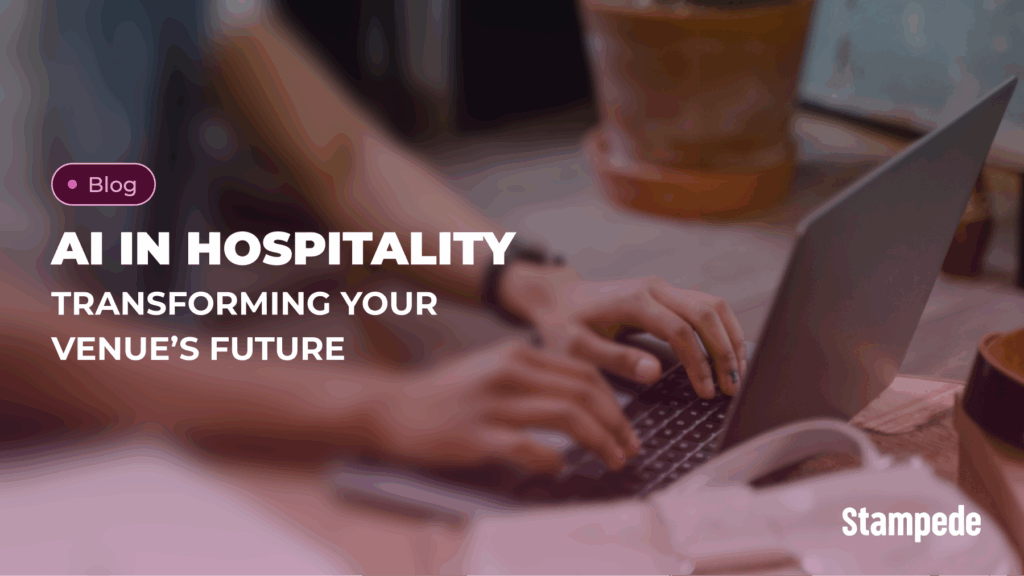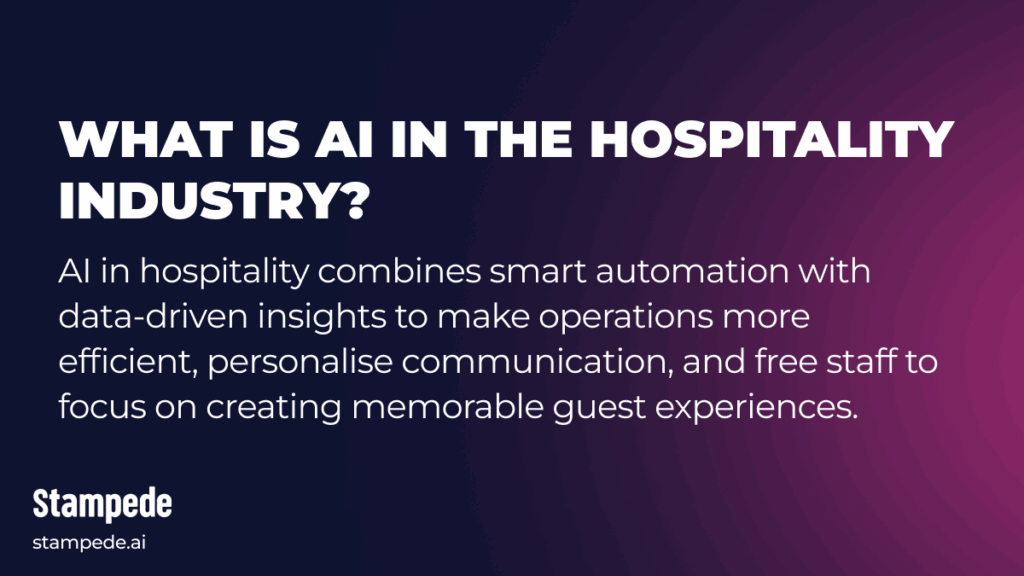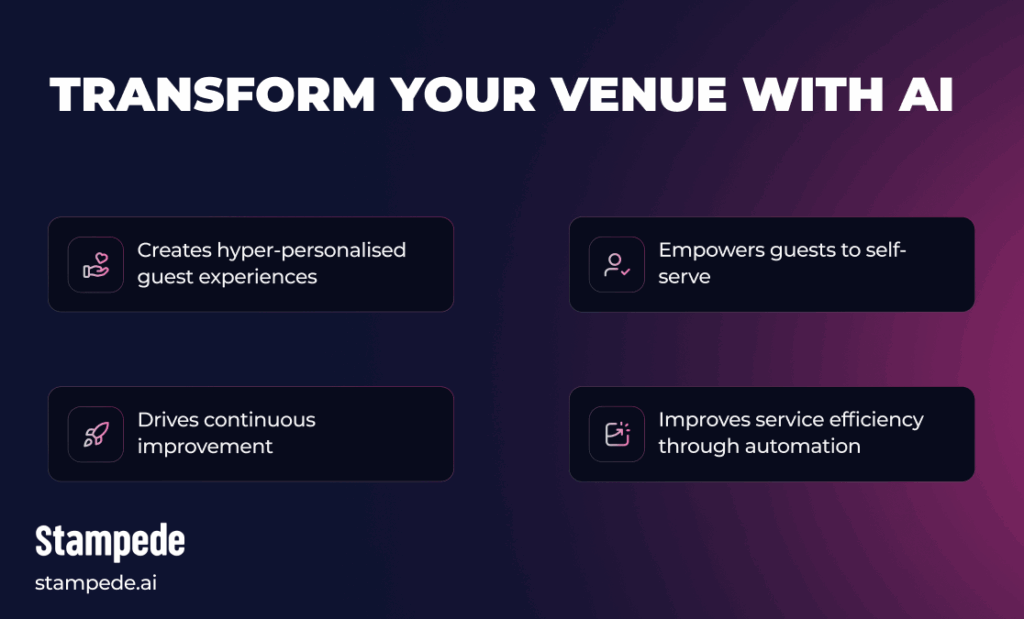Helen Kane
6 min read
AI in Hospitality: Transforming Your Venue’s Future

AI has become one of the biggest talking points across every industry, and hospitality is no exception. Beyond the buzz, it’s proving to be a genuine game changer for operators of all sizes. The best part is that you don’t need to be a tech expert to make it work.
With the right tools running quietly in the background, AI can save hours of admin time, reduce waste, and keep service running smoothly. It helps you spot patterns, predict demand, and take the guesswork out of daily decisions so your team can focus on what really matters: great food, happy guests, and busy venues.
Here’s how you can start putting AI to work in your hospitality business today.

How Hospitality Operators Are Using AI Today
AI is more than just a smart feature. It’s a practical tool that helps hospitality businesses serve guests in new and more meaningful ways. These are some of the most effective ways operators are using AI across the industry today.
1. Responding day or night
In hospitality, availability can make the difference between securing a booking or losing it. Operators juggle multiple priorities, from guest communication and marketing to staffing and supply. During peak times, that pressure only increases.
AI tools can help by streamlining communication and automating processes that once relied on manual effort. They can manage guest enquiries 24/7, predict demand, balance staff schedules, and support data-driven decisions that improve service. All of this frees up time for your team to focus on what they do best: looking after guests.
2. AI-powered table booking platforms
Modern booking systems powered by AI make managing reservations simple and efficient.
AI can optimise table allocation by reviewing guest data, seating patterns, and preferences. This helps venues maximise capacity and ensure smooth service while guests enjoy a more seamless experience.
It can also highlight upselling opportunities based on previous orders or preferences, helping staff make personalised recommendations that increase spend.
And for a common headache like no-shows, AI can identify customers who might be at risk of cancelling and automatically send reminders to reduce empty tables and wasted covers.
3. AI-driven food ordering
AI-based ordering systems have quickly become a go-to solution for restaurants, pubs, and bars looking to reduce wait times and ease pressure on staff.
Self-service kiosks and mobile ordering apps allow guests to order and pay on their own time, either in-venue or before arrival. Newer tools like AI voice ordering are speeding things up even more, letting customers place orders through voice commands.
These systems can also remember past orders and suggest favourites automatically, adding a personal touch without increasing staff workload.
4. Inventory and resource management
Getting stock levels right is a fine balance. Too little and you risk running out; too much and you create waste.
AI helps by predicting what guests are likely to order, combining historic sales data with seasonal and market trends. This improves forecasting accuracy and helps you make smarter purchasing decisions.
The same insights can identify your top-selling items, best pairings, and underperforming products. You can then use that data to refine menus, set specials, and plan promotions more effectively.
Better forecasting means less waste, lower costs, and a healthier bottom line.
5. Reviews management
Online reviews play a huge role in influencing where people choose to eat and drink, but staying on top of them can be time-consuming. AI can simplify the process and strengthen your reputation management.
Instead of manually checking every platform, AI gathers reviews into one dashboard for easy tracking. It can automatically tag themes, detect sentiment, and even draft personalised replies to help you respond faster.
This saves time and ensures consistency in how you engage with guests. Over time, sentiment analysis reveals trends in feedback so you can target improvements where they matter most.
How AI Could Benefit Your Venue
Running a smooth, profitable venue is all about time, efficiency, and knowing your guests. That’s where AI really shines. It takes the guesswork out of daily decisions and helps your team focus on what matters most.
Here are four ways AI is already helping operators raise their game:

Creates hyper-personalised guest experiences
AI analyses guest data from previous visits and interactions to create highly personalised experiences. It can suggest favourite dishes or drinks, recommend offers that suit a guest’s habits, and even adjust messaging based on preferences. This builds stronger relationships and keeps guests coming back.
Empowers guests to self-serve
Guests increasingly prefer to solve simple problems themselves. AI knowledge bases and chat tools make this possible by helping guests find what they need right away. AI can even flag outdated information so your digital content stays accurate and helpful.
Improves service efficiency through automation
AI takes care of repetitive, time-consuming tasks that slow down operations. From automated bookings and order processing to real-time reporting, automation allows teams to deliver faster and more reliable service. The result is smoother operations, happier guests, and more time for meaningful human interaction.
Drives continuous improvement
AI doesn’t just improve what’s happening in the moment. It also analyses every guest interaction to spot opportunities for improvement. If guest sentiment dips, AI can alert managers before issues escalate. If a staff member is managing online chats or reviews, AI can suggest helpful responses in real time.
By learning from every touchpoint, AI helps operators refine their service and deliver a better experience with every visit.
The Future of AI in Hospitality
AI in pubs, bars, and restaurants is only just getting started. The next wave of innovation will make guest experiences more personal and operations even more efficient.
Here’s what to expect in the coming years:
- Smarter and more personal service: AI will use real-time data to understand guest preferences and deliver tailored recommendations. From menu suggestions to personalised offers, every interaction will feel more relevant and genuine.
- Faster and more natural interactions: Voice ordering and conversational chat tools will make it easier for guests to book tables, place orders, or ask questions quickly and easily. This means less waiting and a smoother experience from start to finish.
- Streamlined operations: Behind the scenes, AI will improve staff scheduling, stock management, and reporting. This helps reduce waste, control costs, and keep service consistent across every venue.
- Transparency and trust: As data becomes more valuable, so does the need to handle it responsibly. Operators who are clear about how guest information is used will earn stronger trust and loyalty.
- A stronger focus on sustainability: AI will help venues track energy use, monitor stock, and reduce waste. Smarter systems lead to more sustainable operations that benefit both the environment and your bottom line.
AI is already changing the way pubs, bars, and restaurants operate. From reservations and ordering to inventory and guest engagement, it helps teams work smarter and deliver more consistent service.
It’s not about replacing the people who make hospitality special. It’s about giving them the insights and time to do what they do best. The operators who embrace AI today will be the ones leading the way in a more connected, efficient, and guest-focused future.
See how Stampede is using AI to help venues understand their guests better, deliver personalised offers, and boost return visits.
Search
Popular posts
Sign up to our newsletter